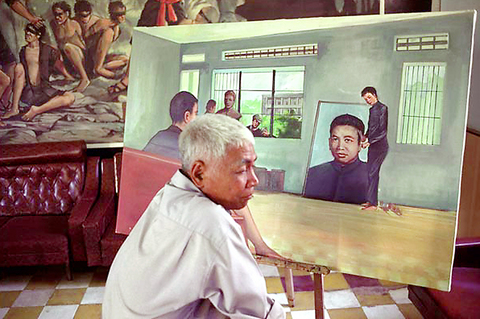When Cambodia recently staged a national film festival, serious drama was in gruesomely short supply: almost half the entries were low-budget horror flicks.
It wasn't always thus.
In the 1960s, now-retired King Norodom Sihanouk was not only the patron of a Cambodian film industry, he was one of its most active practitioners. He wrote, directed and even acted in his own high-minded if formulaic romances and tragedies.

PHOTOS COURTESY OF FOX MOVIES
More than 300 Cambodian films were made during that vibrant era, some well-received in other Asian countries.
But when the communist, puritanical Khmer Rouge regime came to power in the mid-1970s it banned all kinds of entertainment and smashed cameras and film-making equipment.
As the country's spirit began to recover from the Khmer Rouge era, and economic revival took hold in the early 1990s, the industry began to rebound. More than 100 production houses sprang up, mostly using video equipment to churn out movies on a shoestring.
But most of them collapsed because of their amateurism, and the industry is still struggling to recover its former glory.
These days, about five movie making companies have the expertise and strong finances to succeed, said Chheng Sovanna, head of the Culture Ministry's movie production office.
``Most of them are accidental producers, who just spent US$3,000 on a camera, bought some tapes, turned on the light and started shooting,'' said Chheng Sovanna, himself a director who graduated from Russia's State Institute of Cinematography. ``We don't understand the way they make movies.''
And the filmmakers lean more toward anarchy than artistry on screen.
At the recent festival, a typical movie featured a female vampire baring her canine teeth in a grin as she looked for prey. In Nieng Arp, or Lady Vampire, a flying female head with internal organs dangling beneath it chased a terrified couple in the dark.
Nine of the festival's 22 entries were in a similar vein.
``We make movies to suit the domestic market and the demand of our youths,'' said Korm Chanthy, the manager of FCI Productions, which made Nieng Arp.
``They like to watch horror movies because they make them feel excited, thrilled and terrified,'' he said.
The government wasn't impressed. The filmmakers ``injected too much hallucination and superstition'' into their work, complained Culture Minister Prince Sisowath Panara Sirivuth.
``Their understanding of moviemaking is that it's just business,'' he said. ``And they have this misperception that, without training, they can still make movies.''
The government has touted the idea of establishing a film school, but in a country so poor and reliant on foreign aid as Cambodia the idea is unlikely to get off the ground anytime soon.
Producer, 29-year-old Heng Tola, was looking to diversify his computer business when he founded Campro three years ago with several friends.
Making a movie takes Campro about three months and costs an average of US$30,000, including about US$1,000 for the lead actor, he said.
Despite the current taste for horror movies, Heng Tola believes a more serious trend is emerging, prompted in part by the resentment many Cambodians feel about its colonial past and toward domineering neighbors such as Thailand and Vietnam.
One of the festival entries was a nationalistic epic about a peasant protest against high tax imposed by Cambodia's colonial rulers, the French.
``The Cambodian movie is being reborn after a long absence. Its existence has been up and down, and the question now is how we can make it really stand,'' Heng Tola said.

In Taiwan there are two economies: the shiny high tech export economy epitomized by Taiwan Semiconductor Manufacturing Co (TSMC, 台積電) and its outsized effect on global supply chains, and the domestic economy, driven by construction and powered by flows of gravel, sand and government contracts. The latter supports the former: we can have an economy without TSMC, but we can’t have one without construction. The labor shortage has heavily impacted public construction in Taiwan. For example, the first phase of the MRT Wanda Line in Taipei, originally slated for next year, has been pushed back to 2027. The government

July 22 to July 28 The Love River’s (愛河) four-decade run as the host of Kaohsiung’s annual dragon boat races came to an abrupt end in 1971 — the once pristine waterway had become too polluted. The 1970 event was infamous for the putrid stench permeating the air, exacerbated by contestants splashing water and sludge onto the shore and even the onlookers. The relocation of the festivities officially marked the “death” of the river, whose condition had rapidly deteriorated during the previous decade. The myriad factories upstream were only partly to blame; as Kaohsiung’s population boomed in the 1960s, all household

Allegations of corruption against three heavyweight politicians from the three major parties are big in the news now. On Wednesday, prosecutors indicted Hsinchu County Commissioner Yang Wen-ke (楊文科) of the Chinese Nationalist Party (KMT), a judgment is expected this week in the case involving Hsinchu Mayor Ann Kao (高虹安) of the Taiwan People’s Party (TPP) and former deputy premier and Taoyuan Mayor Cheng Wen-tsan (鄭文燦) of the Democratic Progressive Party (DPP) is being held incommunicado in prison. Unlike the other two cases, Cheng’s case has generated considerable speculation, rumors, suspicions and conspiracy theories from both the pan-blue and pan-green camps.

Stepping inside Waley Art (水谷藝術) in Taipei’s historic Wanhua District (萬華區) one leaves the motorcycle growl and air-conditioner purr of the street and enters a very different sonic realm. Speakers hiss, machines whir and objects chime from all five floors of the shophouse-turned- contemporary art gallery (including the basement). “It’s a bit of a metaphor, the stacking of gallery floors is like the layering of sounds,” observes Australian conceptual artist Samuel Beilby, whose audio installation HZ & Machinic Paragenesis occupies the ground floor of the gallery space. He’s not wrong. Put ‘em in a Box (我們把它都裝在一個盒子裡), which runs until Aug. 18, invites